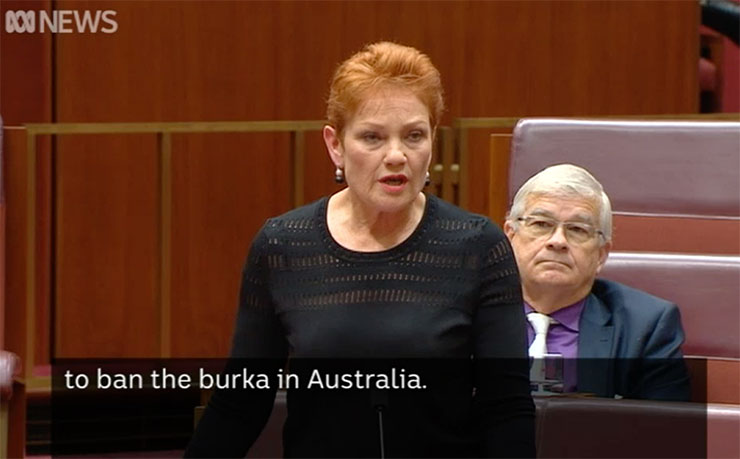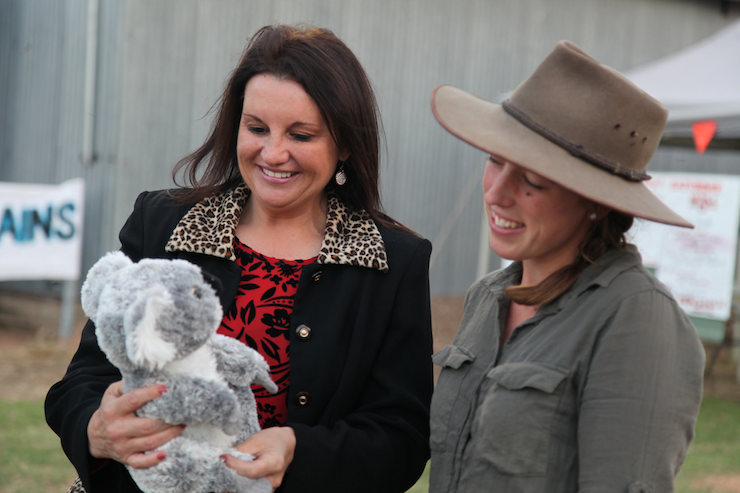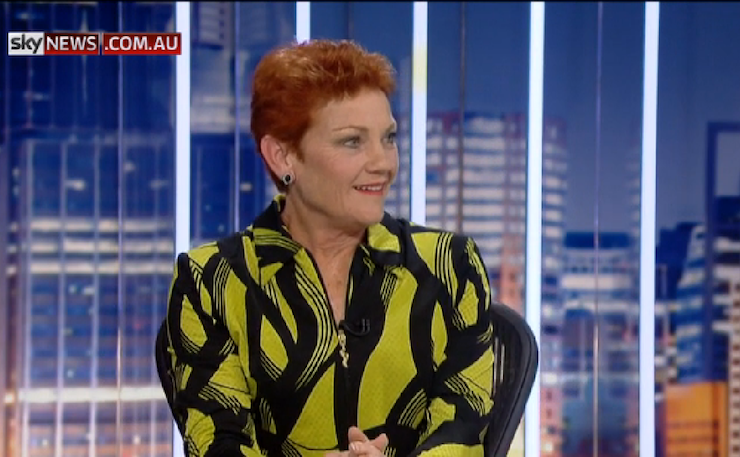Pauline Hanson may have imposed her populism on us all, but Tim Deane-Freeman wonders what Pauline herself is missing out on.
Plutarch has it that the ancient Egyptian city of Sais was home to a veiled statue of that other Isis; mother of Horus and Goddess of magic and fertility. At the base of the statue was an inscription, said to have read, “I am all that has been and is and shall be; and no mortal has ever lifted my mantle.”
17th century German philosopher Immanuel Kant claimed: “Perhaps no-one has said anything more sublime, or expressed a thought more sublimely, than in that inscription…”
A persistent myth held that a young boy, ablaze with curiosity, lifted the veil one night and variously either went mad, saw himself there, or died. Friedrich Nietzsche posed this myth as an allegory for modern “theoretical man,” who had lifted the veil covering nature’s secrets, peered too deeply into existence, and evacuated all meaning from his world.
I’m fairly confident Pauline Hanson hadn’t spent much time meditating on this tradition of thought prior to entering the Federal Senate last week wearing a burqa, which she had apparently purchased on eBay.
I know next to nothing about the burqa. This, if recent history is anything to go by, puts me squarely in the demographic who feel entitled to comment, criticise, castigate and even legislate upon them. I can only write about what I know, and as destined as it makes me for a continued career in hospitality, that happens to be the history of Western philosophy.

And it’s worth noting that even this phallocentric, Eurocentric, middle-class tradition, with which no doubt the likes of Malcolm Roberts, if perhaps not Pauline herself, imagine themselves associated, is pretty ambivalent about the question of veils.
Kant’s concept of the sublime for instance – that strange admixture of awe, terror and pleasure we feel at seeing immense natural phenomena (a raging sea, a vast mountain, a sky alive with lighting) – is predicated on what he feels is a profoundly valuable encounter with the unknown. We see something simply too huge, too powerful, too foreign, for our senses to assimilate it.
Kant, ever the rationalistic European, claimed that at this point, our uniquely human faculty of reason enters the fray, assuring us that we are safe, that our capacity for logic can make sense of anything, and leaving us with a sense of pleasure at our cleverness.
My own favourite philosopher, Gilles Deleuze, casts aside the slight smugness of this account; it’s not our reason that saves us from the terror of the veiled sublime, but our imagination, our ability to respond creatively with solutions to the unknown; with art, with science, with thought.
In both accounts, it is a profound encounter with the radically unknown, with a veiled and necessarily hidden truth, that causes us to respond with the intelligence and imagination which define us as human beings.
Some theologies maintain mechanisms for the preservation of this ‘hidden sacred,’ this sense of mystery at the heart of life, which must be carefully protected. That is certainly one of the key functions of the certain hadith (or supplemental teachings to the Qur’an) which prohibit the depiction of the prophet Muhammad.
Judaism too adheres to a relatively strict aniconism, with depictions of YHWH expressly forbidden, especially in statue form. Christianity however, with the economic adaptability for which it would become known, was able to shed its own commandment and get back to making graven idols fairly promptly.
Indeed, notoriously difficult French philosopher Jacques Derrida identified this as the great theological schism within the Abrahamic religions, between “religions of the secret,” like Judaism and Islam, which rely on certain esoteric concealments, and “good news religions,” like Christianity, who wanted to tell everybody everywhere that the miracle had happened, and their saviour had come. Derrida not unconvincingly links this theology to the invention of the printing press in Reformation-era Europe, the extensive religious pamphleteering and publishing that accompanied it, and the emergence of the ‘media’ as we have inherited it today. It’s thus worth briefly noting, even if one is a smug atheist like myself, how saturated in religion are the behaviours, technologies and ideas we all use every day.
This showdown between “religions of the secret” and the “good news religion” of Western mediatised Christianity continues today, with periodical skirmishes around depictions of Muhammad, like those which pre-empted the deplorable attack on the Charlie Hebdo offices in Paris in 2015.
The burqa emerges from this other side of the Abrahamic break, where concealment and the esoteric, as opposed to revelation and proselytization, are key theological devices for proliferating and honouring the sacred.
Let’s be absolutely clear- it also emerges from a millennia-long campaign by the globe’s almost universally patriarchal societies to conform and control the female body. Indeed, I’m aware that there are concerted feminist movements (in Iran, Afghanistan and elsewhere), against the burqa, which undoubtedly has been, and continues to be, used as a tool of patriarchal oppression (you’ll forgive me for being sceptical when the likes of Jacqui Lambie or One Nation take this tack, their feminist commitments seem somewhat patchy elsewhere).

However, I’m also well aware that our own society is a patriarchy, and it doesn’t require much in the way of mental gymnastics to understand that the body-policing, unrealistic standards of beauty and hyper-sexualisation of the female form in the West has served similar ends. In purely anecdotal terms, the anxieties that most of the women I know well hold about their bodies, a policing they have been subjected to throughout their lives, would seem to attest to this.
Many of these women, however, and many men, have taken delight in redeploying this attempted indoctrination, embracing third wave feminist paradigms and performing ‘traditional’ femininity and sexuality in their own and subversive ways.
The same redeployments, I know, take place in the context of traditional Islamic standards of femininity. Yassmin Abdel-Mageid, a wearer of the hijab since the age of 10, elicited giggles from the audience when she claimed, on ABC’s Q&A programme, that “for me, Islam is the most feminist religion”. The audience, and Abdel-Mageid’s sparring partner Jacqui Lambie, seemed to have universally missed that sentence’s fundamental clause: “for me…”
We do not choose the historical and ideological traditions from which we emerge. As Australian philosopher Claire Colebrook notes, they are in fact constitutive of us as human beings. What is important, however is what we come to do with them, as she writes:
The concept of woman, for example, is ideological. I act, desire and believe in a certain way because I have (or think myself through) this concept. This does not mean that the concept is false, for ideology is not error. Ideology describes the way our relations and beliefs – and therefore what we do – are structured beforehand by forces that transcend any individual agent. I did not invent or decide upon the concept of ‘woman’, but it is nevertheless integral and constitutive of my being. Furthermore, the way I live this concept is political; it ties me into certain relations with others, and leads me to assume certain rights, duties and obligations.
The political (re)performance of one’s inheritance, be it a gender, a language, a culture or a garment, is a complex, conflictual and potentially liberating process, and many Muslim women have no doubt found empowerment on this uncertain path.
European culture embarked upon its half-millennia of colonisation and genocide equipped with a profound sense of certainty. Certainty it was superior, certainty that its ‘natural laws’ and presuppositions were universal and needed to be imposed upon the globe. In the context of eschewing this long tradition from which I emerge, I do not seek to mount a concerted defence of the burqa, because it’s not for me to do so. And besides I just don’t know.
I only hope to gesture towards other modes of thought, towards ideas of the sacredness of concealment and uncertainty which we in the West may have lost, and from which we might seek to learn.
Again, I suspect such things were far from Senator Hanson’s mind when she entered the upper house last Thursday. A dyed-in-the-wool populist whose gaze was squarely fixed on the media attention her stunt would garner (and of which this piece is a part), she had no time for such profound considerations.
And it is for this reason that I pity her.

This sense of the unknown to which I’ve gestured – of complexities, contradictions, of things always and necessarily veiled from our own inherited perspectives – and of forging creative, thoughtful responses to them, is the very stuff of life.
This is how love works, surely, in contradiction and uncertainty, in the faith and fear of opening yourself to an Other. This is how, in its ineffability, it frees us from the bounds of the atomised subject and shows us the world as it really is. Great art and science too, work by responding to the unknown with creativity and openness, not dogma and pre-ordained ideas.
The knowledge that there are experiences radically foreign to my own, that every day I’ll face complex, contradictory things which make me uncomfortable, force me to change and grow to accommodate them, is what gets me out of bed each day. I, for one, am endlessly glad that the country in which I was raised will not be the country in which I grow old, that to live is to change and face the future endlessly.
This is not the smugness of book-learning or scholarship, one doesn’t need to refer to a clutch of dead philosophers to make such arguments, or build them into think-pieces. I’ve seen enough of the world to know that people of all kinds and in all places have these experiences of vulnerability, openness and discovery every day.
It is the great poverty of Pauline Hanson and her ilk that their lives will never know such subtle wonders.
Donate To New Matilda
New Matilda is a small, independent media outlet. We survive through reader contributions, and never losing a lawsuit. If you got something from this article, giving something back helps us to continue speaking truth to power. Every little bit counts.






